Entrepreneurship Report: Small Business, Brexit, and Success
VerifiedAdded on 2020/10/22
|16
|4692
|119
Report
AI Summary
This report provides a comprehensive overview of entrepreneurship, exploring various venture types such as small businesses, scalable startups, large-scale enterprises, and social enterprises. It delves into their interrelations and typologies, highlighting the similarities and differences between them. The report examines the significant impact of micro and small businesses on the UK economy, emphasizing their role in generating employment, fostering innovation, and contributing to economic growth. It specifically addresses the contribution of small businesses to the social economy following Brexit, analyzing how they stepped in to mitigate economic challenges. Furthermore, the report discusses the characteristics, traits, and skills of successful entrepreneurs, including the role of personality in shaping their motivation and mindset. It also explores how an individual's background and experience can either hinder or foster entrepreneurial endeavors. The report concludes by summarizing the key findings and their implications for understanding the dynamics of entrepreneurship in the UK context.

Entrepreneurship
Paraphrase This Document
Need a fresh take? Get an instant paraphrase of this document with our AI Paraphraser
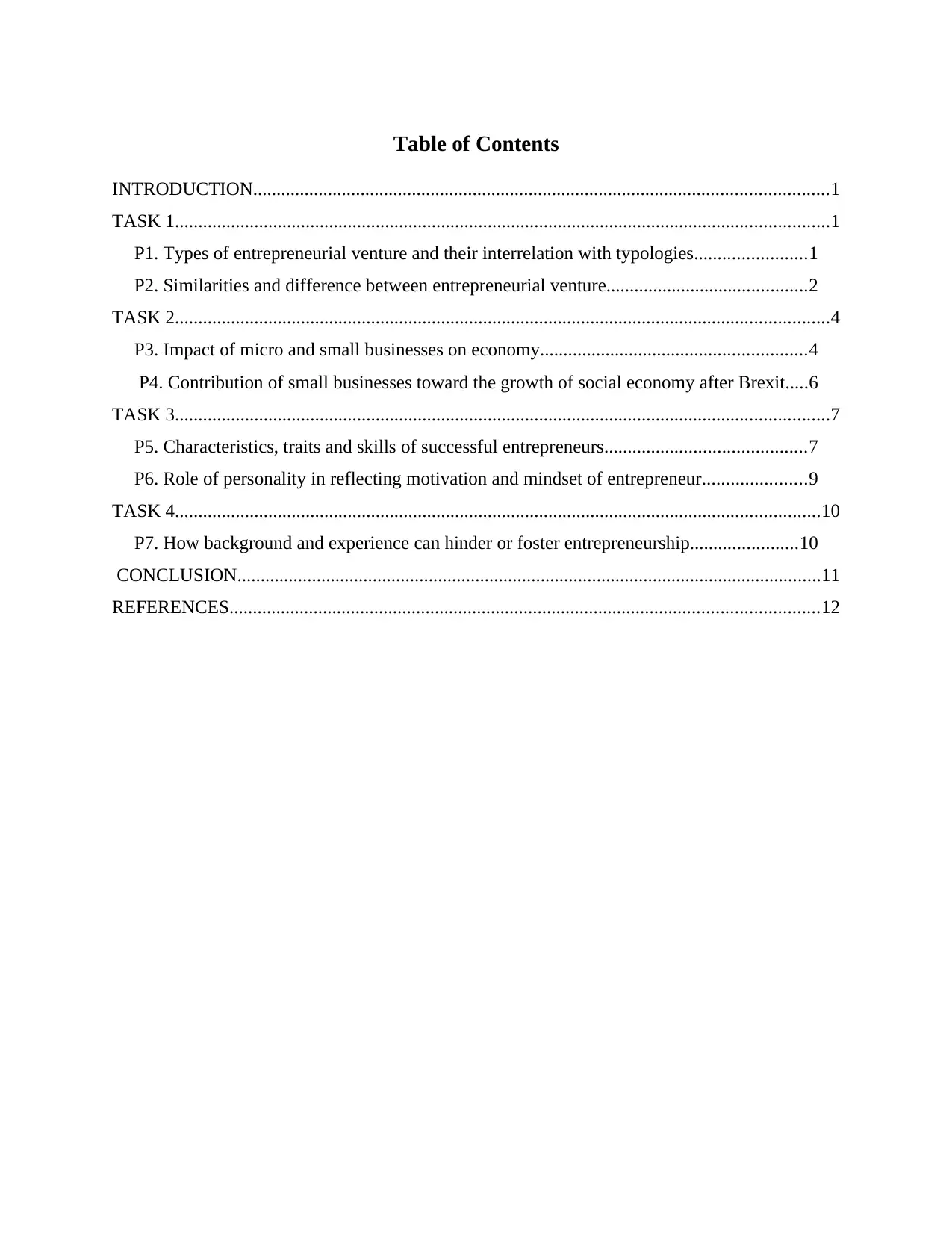
Table of Contents
INTRODUCTION...........................................................................................................................1
TASK 1............................................................................................................................................1
P1. Types of entrepreneurial venture and their interrelation with typologies........................1
P2. Similarities and difference between entrepreneurial venture...........................................2
TASK 2............................................................................................................................................4
P3. Impact of micro and small businesses on economy.........................................................4
P4. Contribution of small businesses toward the growth of social economy after Brexit.....6
TASK 3............................................................................................................................................7
P5. Characteristics, traits and skills of successful entrepreneurs...........................................7
P6. Role of personality in reflecting motivation and mindset of entrepreneur......................9
TASK 4..........................................................................................................................................10
P7. How background and experience can hinder or foster entrepreneurship.......................10
CONCLUSION.............................................................................................................................11
REFERENCES..............................................................................................................................12
INTRODUCTION...........................................................................................................................1
TASK 1............................................................................................................................................1
P1. Types of entrepreneurial venture and their interrelation with typologies........................1
P2. Similarities and difference between entrepreneurial venture...........................................2
TASK 2............................................................................................................................................4
P3. Impact of micro and small businesses on economy.........................................................4
P4. Contribution of small businesses toward the growth of social economy after Brexit.....6
TASK 3............................................................................................................................................7
P5. Characteristics, traits and skills of successful entrepreneurs...........................................7
P6. Role of personality in reflecting motivation and mindset of entrepreneur......................9
TASK 4..........................................................................................................................................10
P7. How background and experience can hinder or foster entrepreneurship.......................10
CONCLUSION.............................................................................................................................11
REFERENCES..............................................................................................................................12

⊘ This is a preview!⊘
Do you want full access?
Subscribe today to unlock all pages.

Trusted by 1+ million students worldwide
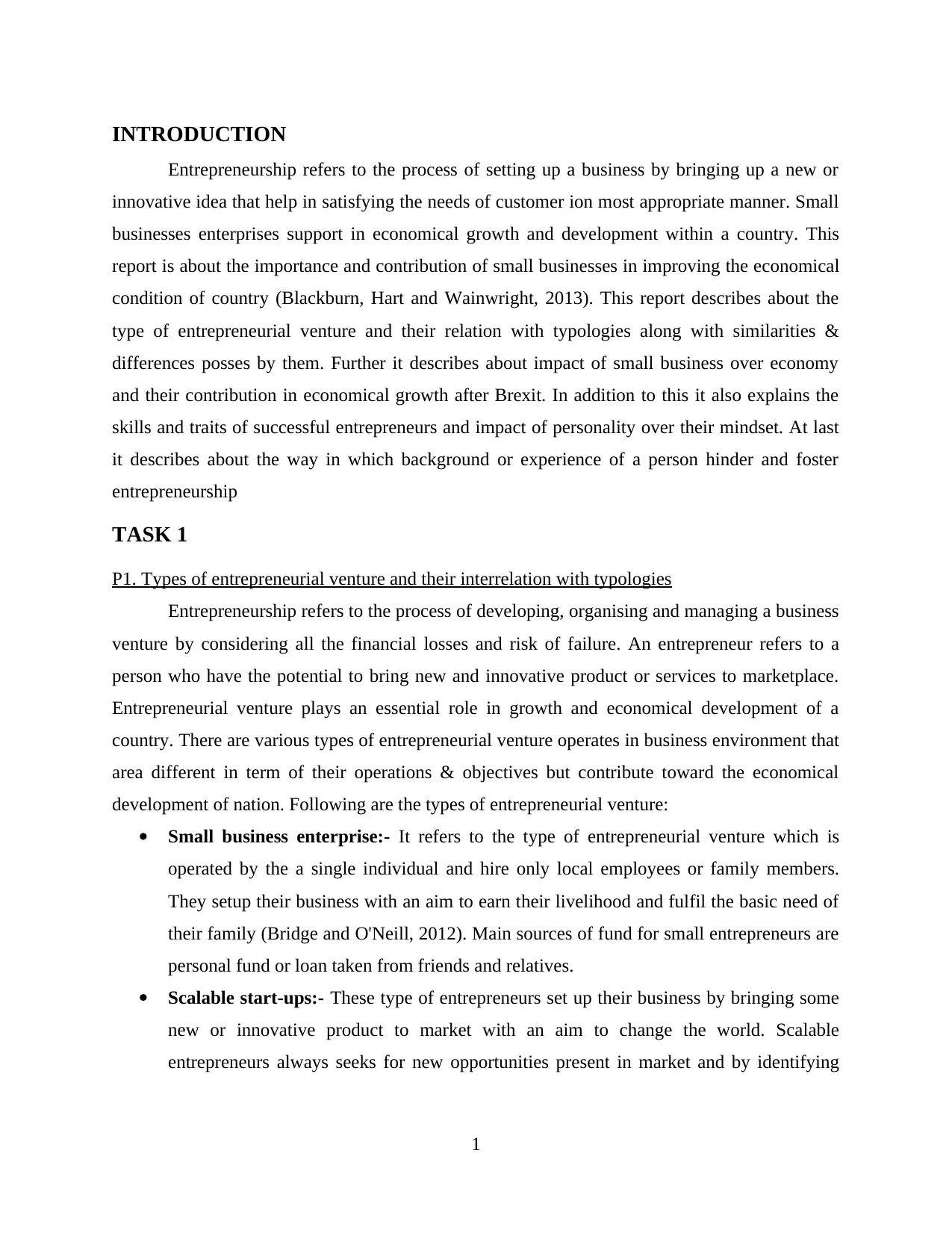
INTRODUCTION
Entrepreneurship refers to the process of setting up a business by bringing up a new or
innovative idea that help in satisfying the needs of customer ion most appropriate manner. Small
businesses enterprises support in economical growth and development within a country. This
report is about the importance and contribution of small businesses in improving the economical
condition of country (Blackburn, Hart and Wainwright, 2013). This report describes about the
type of entrepreneurial venture and their relation with typologies along with similarities &
differences posses by them. Further it describes about impact of small business over economy
and their contribution in economical growth after Brexit. In addition to this it also explains the
skills and traits of successful entrepreneurs and impact of personality over their mindset. At last
it describes about the way in which background or experience of a person hinder and foster
entrepreneurship
TASK 1
P1. Types of entrepreneurial venture and their interrelation with typologies
Entrepreneurship refers to the process of developing, organising and managing a business
venture by considering all the financial losses and risk of failure. An entrepreneur refers to a
person who have the potential to bring new and innovative product or services to marketplace.
Entrepreneurial venture plays an essential role in growth and economical development of a
country. There are various types of entrepreneurial venture operates in business environment that
area different in term of their operations & objectives but contribute toward the economical
development of nation. Following are the types of entrepreneurial venture:
Small business enterprise:- It refers to the type of entrepreneurial venture which is
operated by the a single individual and hire only local employees or family members.
They setup their business with an aim to earn their livelihood and fulfil the basic need of
their family (Bridge and O'Neill, 2012). Main sources of fund for small entrepreneurs are
personal fund or loan taken from friends and relatives.
Scalable start-ups:- These type of entrepreneurs set up their business by bringing some
new or innovative product to market with an aim to change the world. Scalable
entrepreneurs always seeks for new opportunities present in market and by identifying
1
Entrepreneurship refers to the process of setting up a business by bringing up a new or
innovative idea that help in satisfying the needs of customer ion most appropriate manner. Small
businesses enterprises support in economical growth and development within a country. This
report is about the importance and contribution of small businesses in improving the economical
condition of country (Blackburn, Hart and Wainwright, 2013). This report describes about the
type of entrepreneurial venture and their relation with typologies along with similarities &
differences posses by them. Further it describes about impact of small business over economy
and their contribution in economical growth after Brexit. In addition to this it also explains the
skills and traits of successful entrepreneurs and impact of personality over their mindset. At last
it describes about the way in which background or experience of a person hinder and foster
entrepreneurship
TASK 1
P1. Types of entrepreneurial venture and their interrelation with typologies
Entrepreneurship refers to the process of developing, organising and managing a business
venture by considering all the financial losses and risk of failure. An entrepreneur refers to a
person who have the potential to bring new and innovative product or services to marketplace.
Entrepreneurial venture plays an essential role in growth and economical development of a
country. There are various types of entrepreneurial venture operates in business environment that
area different in term of their operations & objectives but contribute toward the economical
development of nation. Following are the types of entrepreneurial venture:
Small business enterprise:- It refers to the type of entrepreneurial venture which is
operated by the a single individual and hire only local employees or family members.
They setup their business with an aim to earn their livelihood and fulfil the basic need of
their family (Bridge and O'Neill, 2012). Main sources of fund for small entrepreneurs are
personal fund or loan taken from friends and relatives.
Scalable start-ups:- These type of entrepreneurs set up their business by bringing some
new or innovative product to market with an aim to change the world. Scalable
entrepreneurs always seeks for new opportunities present in market and by identifying
1
Paraphrase This Document
Need a fresh take? Get an instant paraphrase of this document with our AI Paraphraser
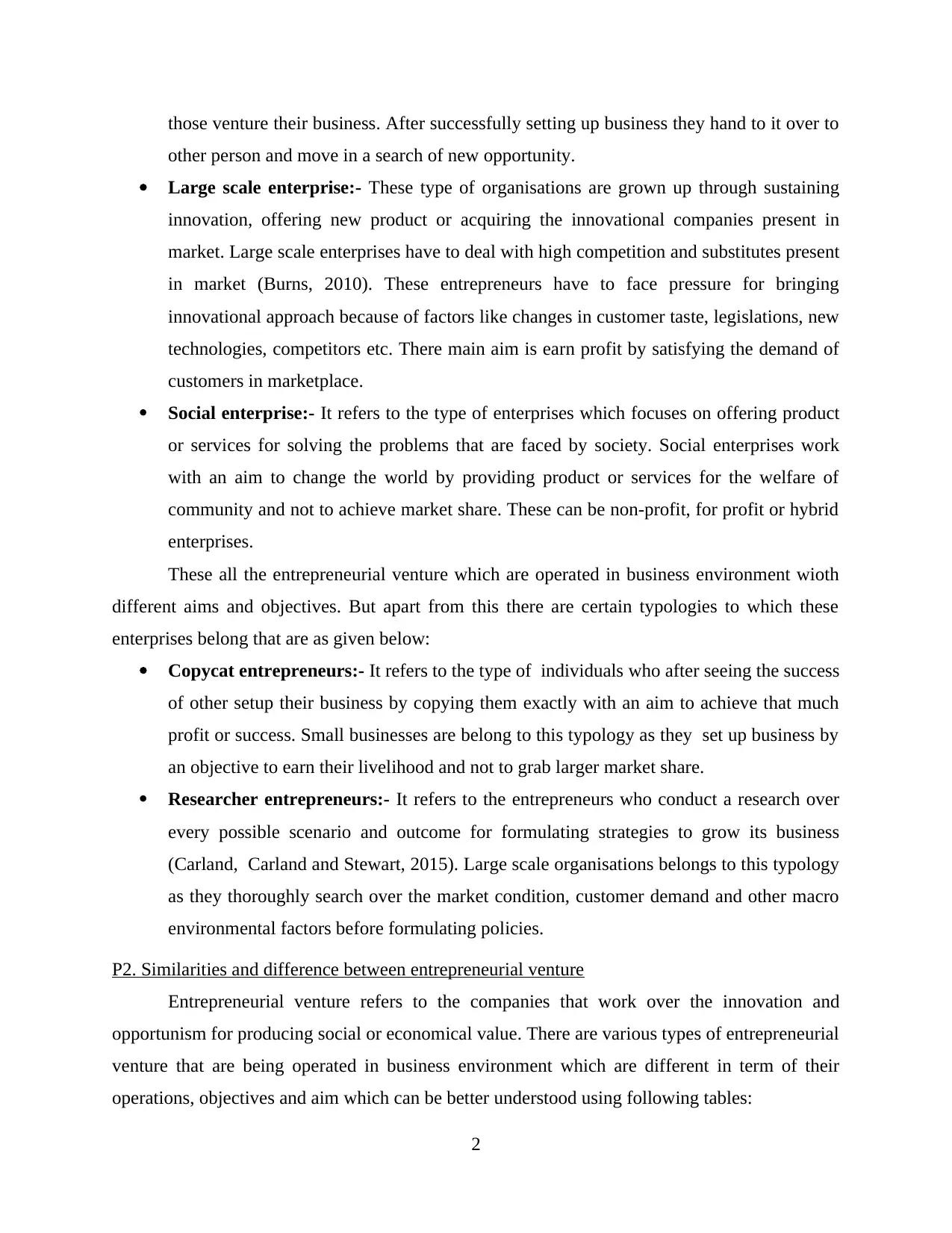
those venture their business. After successfully setting up business they hand to it over to
other person and move in a search of new opportunity.
Large scale enterprise:- These type of organisations are grown up through sustaining
innovation, offering new product or acquiring the innovational companies present in
market. Large scale enterprises have to deal with high competition and substitutes present
in market (Burns, 2010). These entrepreneurs have to face pressure for bringing
innovational approach because of factors like changes in customer taste, legislations, new
technologies, competitors etc. There main aim is earn profit by satisfying the demand of
customers in marketplace.
Social enterprise:- It refers to the type of enterprises which focuses on offering product
or services for solving the problems that are faced by society. Social enterprises work
with an aim to change the world by providing product or services for the welfare of
community and not to achieve market share. These can be non-profit, for profit or hybrid
enterprises.
These all the entrepreneurial venture which are operated in business environment wioth
different aims and objectives. But apart from this there are certain typologies to which these
enterprises belong that are as given below:
Copycat entrepreneurs:- It refers to the type of individuals who after seeing the success
of other setup their business by copying them exactly with an aim to achieve that much
profit or success. Small businesses are belong to this typology as they set up business by
an objective to earn their livelihood and not to grab larger market share.
Researcher entrepreneurs:- It refers to the entrepreneurs who conduct a research over
every possible scenario and outcome for formulating strategies to grow its business
(Carland, Carland and Stewart, 2015). Large scale organisations belongs to this typology
as they thoroughly search over the market condition, customer demand and other macro
environmental factors before formulating policies.
P2. Similarities and difference between entrepreneurial venture
Entrepreneurial venture refers to the companies that work over the innovation and
opportunism for producing social or economical value. There are various types of entrepreneurial
venture that are being operated in business environment which are different in term of their
operations, objectives and aim which can be better understood using following tables:
2
other person and move in a search of new opportunity.
Large scale enterprise:- These type of organisations are grown up through sustaining
innovation, offering new product or acquiring the innovational companies present in
market. Large scale enterprises have to deal with high competition and substitutes present
in market (Burns, 2010). These entrepreneurs have to face pressure for bringing
innovational approach because of factors like changes in customer taste, legislations, new
technologies, competitors etc. There main aim is earn profit by satisfying the demand of
customers in marketplace.
Social enterprise:- It refers to the type of enterprises which focuses on offering product
or services for solving the problems that are faced by society. Social enterprises work
with an aim to change the world by providing product or services for the welfare of
community and not to achieve market share. These can be non-profit, for profit or hybrid
enterprises.
These all the entrepreneurial venture which are operated in business environment wioth
different aims and objectives. But apart from this there are certain typologies to which these
enterprises belong that are as given below:
Copycat entrepreneurs:- It refers to the type of individuals who after seeing the success
of other setup their business by copying them exactly with an aim to achieve that much
profit or success. Small businesses are belong to this typology as they set up business by
an objective to earn their livelihood and not to grab larger market share.
Researcher entrepreneurs:- It refers to the entrepreneurs who conduct a research over
every possible scenario and outcome for formulating strategies to grow its business
(Carland, Carland and Stewart, 2015). Large scale organisations belongs to this typology
as they thoroughly search over the market condition, customer demand and other macro
environmental factors before formulating policies.
P2. Similarities and difference between entrepreneurial venture
Entrepreneurial venture refers to the companies that work over the innovation and
opportunism for producing social or economical value. There are various types of entrepreneurial
venture that are being operated in business environment which are different in term of their
operations, objectives and aim which can be better understood using following tables:
2
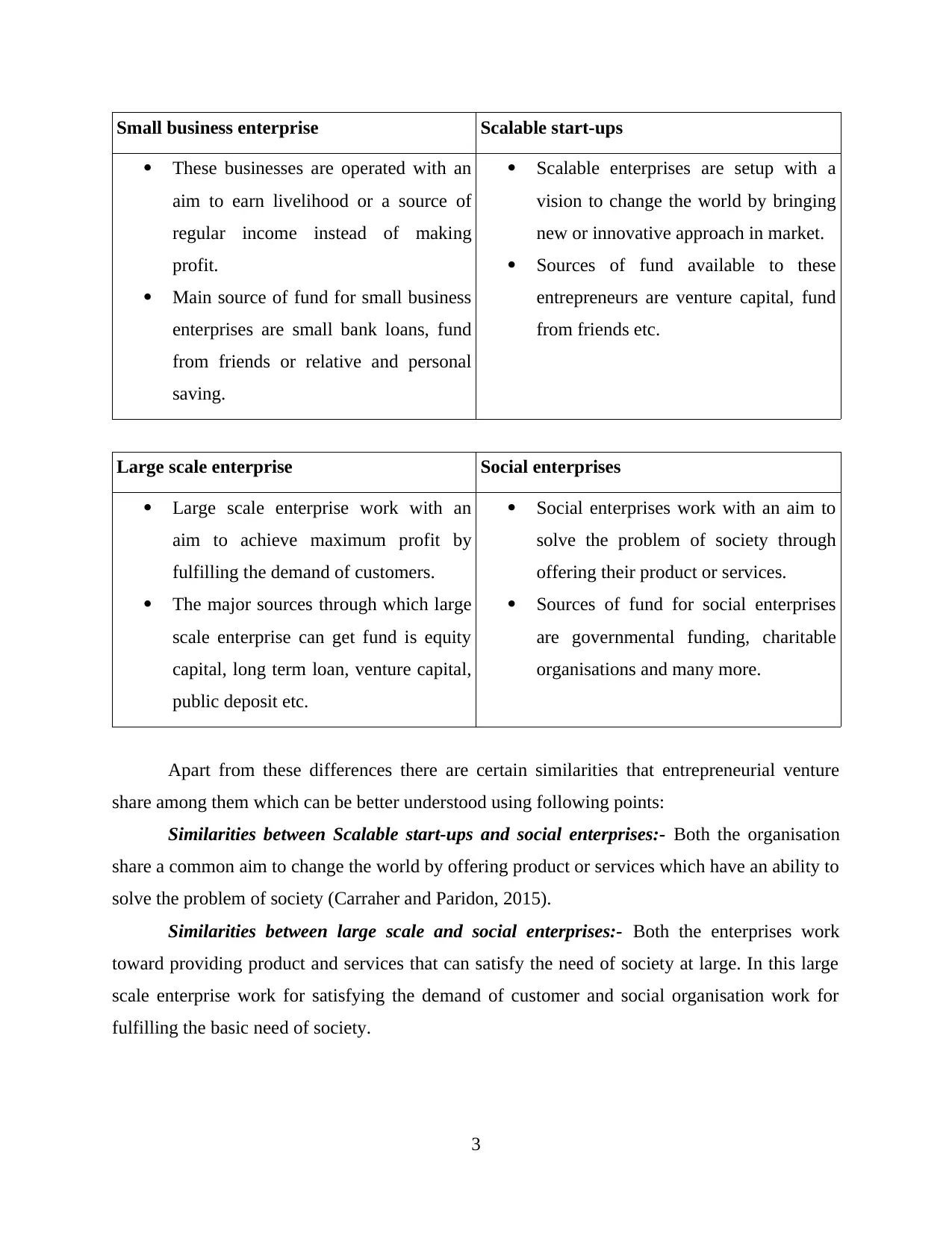
Small business enterprise Scalable start-ups
These businesses are operated with an
aim to earn livelihood or a source of
regular income instead of making
profit.
Main source of fund for small business
enterprises are small bank loans, fund
from friends or relative and personal
saving.
Scalable enterprises are setup with a
vision to change the world by bringing
new or innovative approach in market.
Sources of fund available to these
entrepreneurs are venture capital, fund
from friends etc.
Large scale enterprise Social enterprises
Large scale enterprise work with an
aim to achieve maximum profit by
fulfilling the demand of customers.
The major sources through which large
scale enterprise can get fund is equity
capital, long term loan, venture capital,
public deposit etc.
Social enterprises work with an aim to
solve the problem of society through
offering their product or services.
Sources of fund for social enterprises
are governmental funding, charitable
organisations and many more.
Apart from these differences there are certain similarities that entrepreneurial venture
share among them which can be better understood using following points:
Similarities between Scalable start-ups and social enterprises:- Both the organisation
share a common aim to change the world by offering product or services which have an ability to
solve the problem of society (Carraher and Paridon, 2015).
Similarities between large scale and social enterprises:- Both the enterprises work
toward providing product and services that can satisfy the need of society at large. In this large
scale enterprise work for satisfying the demand of customer and social organisation work for
fulfilling the basic need of society.
3
These businesses are operated with an
aim to earn livelihood or a source of
regular income instead of making
profit.
Main source of fund for small business
enterprises are small bank loans, fund
from friends or relative and personal
saving.
Scalable enterprises are setup with a
vision to change the world by bringing
new or innovative approach in market.
Sources of fund available to these
entrepreneurs are venture capital, fund
from friends etc.
Large scale enterprise Social enterprises
Large scale enterprise work with an
aim to achieve maximum profit by
fulfilling the demand of customers.
The major sources through which large
scale enterprise can get fund is equity
capital, long term loan, venture capital,
public deposit etc.
Social enterprises work with an aim to
solve the problem of society through
offering their product or services.
Sources of fund for social enterprises
are governmental funding, charitable
organisations and many more.
Apart from these differences there are certain similarities that entrepreneurial venture
share among them which can be better understood using following points:
Similarities between Scalable start-ups and social enterprises:- Both the organisation
share a common aim to change the world by offering product or services which have an ability to
solve the problem of society (Carraher and Paridon, 2015).
Similarities between large scale and social enterprises:- Both the enterprises work
toward providing product and services that can satisfy the need of society at large. In this large
scale enterprise work for satisfying the demand of customer and social organisation work for
fulfilling the basic need of society.
3
⊘ This is a preview!⊘
Do you want full access?
Subscribe today to unlock all pages.

Trusted by 1+ million students worldwide
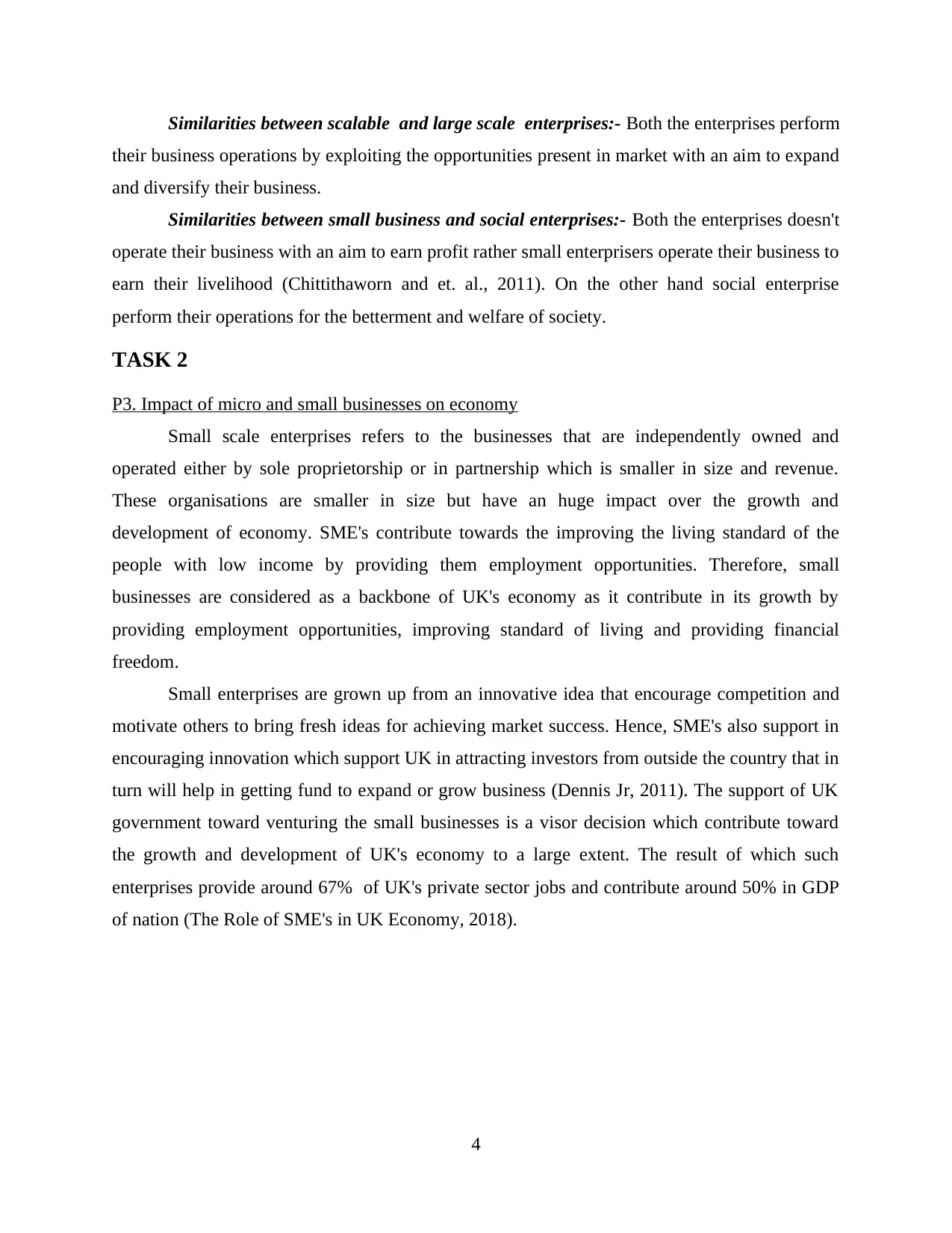
Similarities between scalable and large scale enterprises:- Both the enterprises perform
their business operations by exploiting the opportunities present in market with an aim to expand
and diversify their business.
Similarities between small business and social enterprises:- Both the enterprises doesn't
operate their business with an aim to earn profit rather small enterprisers operate their business to
earn their livelihood (Chittithaworn and et. al., 2011). On the other hand social enterprise
perform their operations for the betterment and welfare of society.
TASK 2
P3. Impact of micro and small businesses on economy
Small scale enterprises refers to the businesses that are independently owned and
operated either by sole proprietorship or in partnership which is smaller in size and revenue.
These organisations are smaller in size but have an huge impact over the growth and
development of economy. SME's contribute towards the improving the living standard of the
people with low income by providing them employment opportunities. Therefore, small
businesses are considered as a backbone of UK's economy as it contribute in its growth by
providing employment opportunities, improving standard of living and providing financial
freedom.
Small enterprises are grown up from an innovative idea that encourage competition and
motivate others to bring fresh ideas for achieving market success. Hence, SME's also support in
encouraging innovation which support UK in attracting investors from outside the country that in
turn will help in getting fund to expand or grow business (Dennis Jr, 2011). The support of UK
government toward venturing the small businesses is a visor decision which contribute toward
the growth and development of UK's economy to a large extent. The result of which such
enterprises provide around 67% of UK's private sector jobs and contribute around 50% in GDP
of nation (The Role of SME's in UK Economy, 2018).
4
their business operations by exploiting the opportunities present in market with an aim to expand
and diversify their business.
Similarities between small business and social enterprises:- Both the enterprises doesn't
operate their business with an aim to earn profit rather small enterprisers operate their business to
earn their livelihood (Chittithaworn and et. al., 2011). On the other hand social enterprise
perform their operations for the betterment and welfare of society.
TASK 2
P3. Impact of micro and small businesses on economy
Small scale enterprises refers to the businesses that are independently owned and
operated either by sole proprietorship or in partnership which is smaller in size and revenue.
These organisations are smaller in size but have an huge impact over the growth and
development of economy. SME's contribute towards the improving the living standard of the
people with low income by providing them employment opportunities. Therefore, small
businesses are considered as a backbone of UK's economy as it contribute in its growth by
providing employment opportunities, improving standard of living and providing financial
freedom.
Small enterprises are grown up from an innovative idea that encourage competition and
motivate others to bring fresh ideas for achieving market success. Hence, SME's also support in
encouraging innovation which support UK in attracting investors from outside the country that in
turn will help in getting fund to expand or grow business (Dennis Jr, 2011). The support of UK
government toward venturing the small businesses is a visor decision which contribute toward
the growth and development of UK's economy to a large extent. The result of which such
enterprises provide around 67% of UK's private sector jobs and contribute around 50% in GDP
of nation (The Role of SME's in UK Economy, 2018).
4
Paraphrase This Document
Need a fresh take? Get an instant paraphrase of this document with our AI Paraphraser
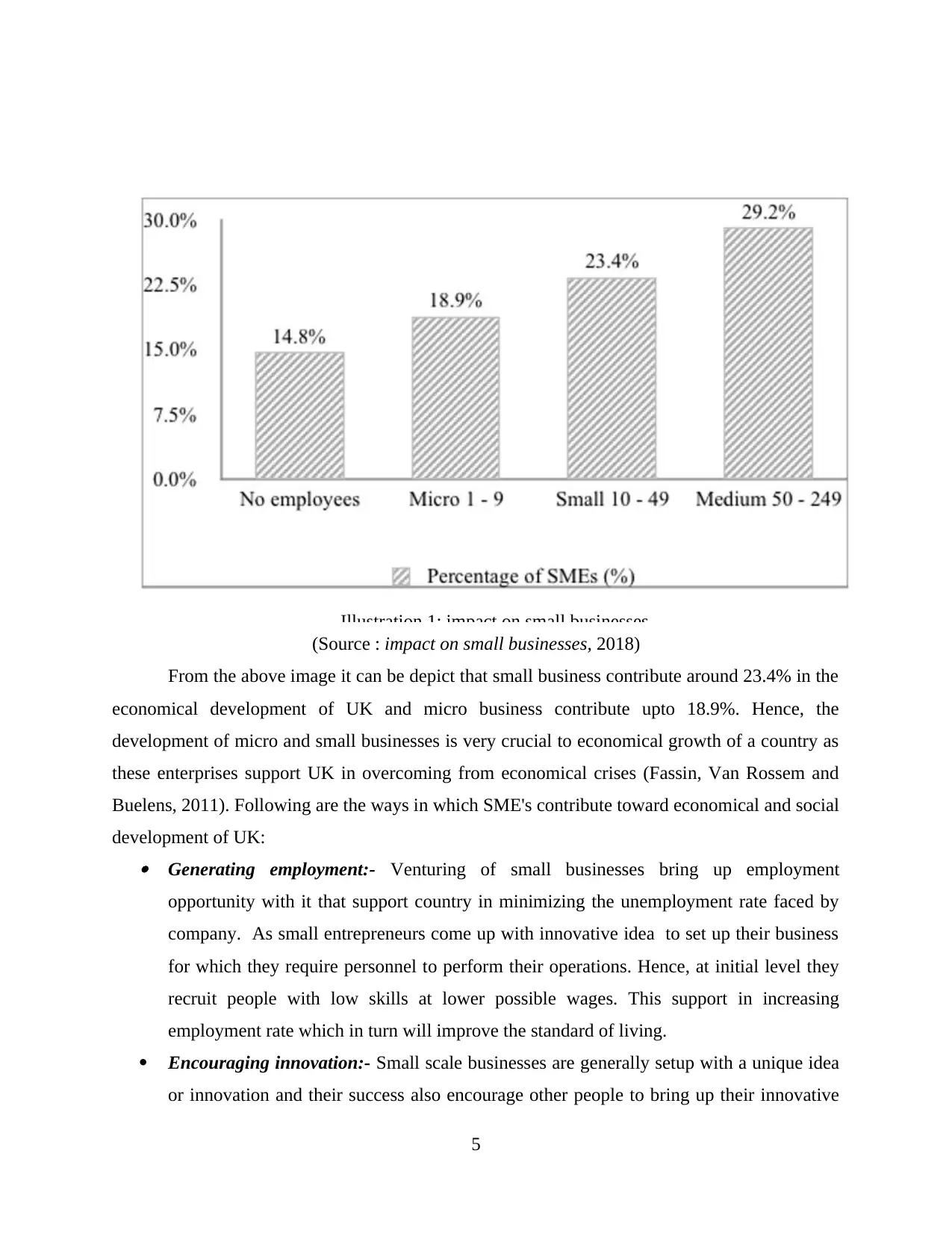
(Source : impact on small businesses, 2018)
From the above image it can be depict that small business contribute around 23.4% in the
economical development of UK and micro business contribute upto 18.9%. Hence, the
development of micro and small businesses is very crucial to economical growth of a country as
these enterprises support UK in overcoming from economical crises (Fassin, Van Rossem and
Buelens, 2011). Following are the ways in which SME's contribute toward economical and social
development of UK: Generating employment:- Venturing of small businesses bring up employment
opportunity with it that support country in minimizing the unemployment rate faced by
company. As small entrepreneurs come up with innovative idea to set up their business
for which they require personnel to perform their operations. Hence, at initial level they
recruit people with low skills at lower possible wages. This support in increasing
employment rate which in turn will improve the standard of living.
Encouraging innovation:- Small scale businesses are generally setup with a unique idea
or innovation and their success also encourage other people to bring up their innovative
5
Illustration 1: impact on small businesses
From the above image it can be depict that small business contribute around 23.4% in the
economical development of UK and micro business contribute upto 18.9%. Hence, the
development of micro and small businesses is very crucial to economical growth of a country as
these enterprises support UK in overcoming from economical crises (Fassin, Van Rossem and
Buelens, 2011). Following are the ways in which SME's contribute toward economical and social
development of UK: Generating employment:- Venturing of small businesses bring up employment
opportunity with it that support country in minimizing the unemployment rate faced by
company. As small entrepreneurs come up with innovative idea to set up their business
for which they require personnel to perform their operations. Hence, at initial level they
recruit people with low skills at lower possible wages. This support in increasing
employment rate which in turn will improve the standard of living.
Encouraging innovation:- Small scale businesses are generally setup with a unique idea
or innovation and their success also encourage other people to bring up their innovative
5
Illustration 1: impact on small businesses
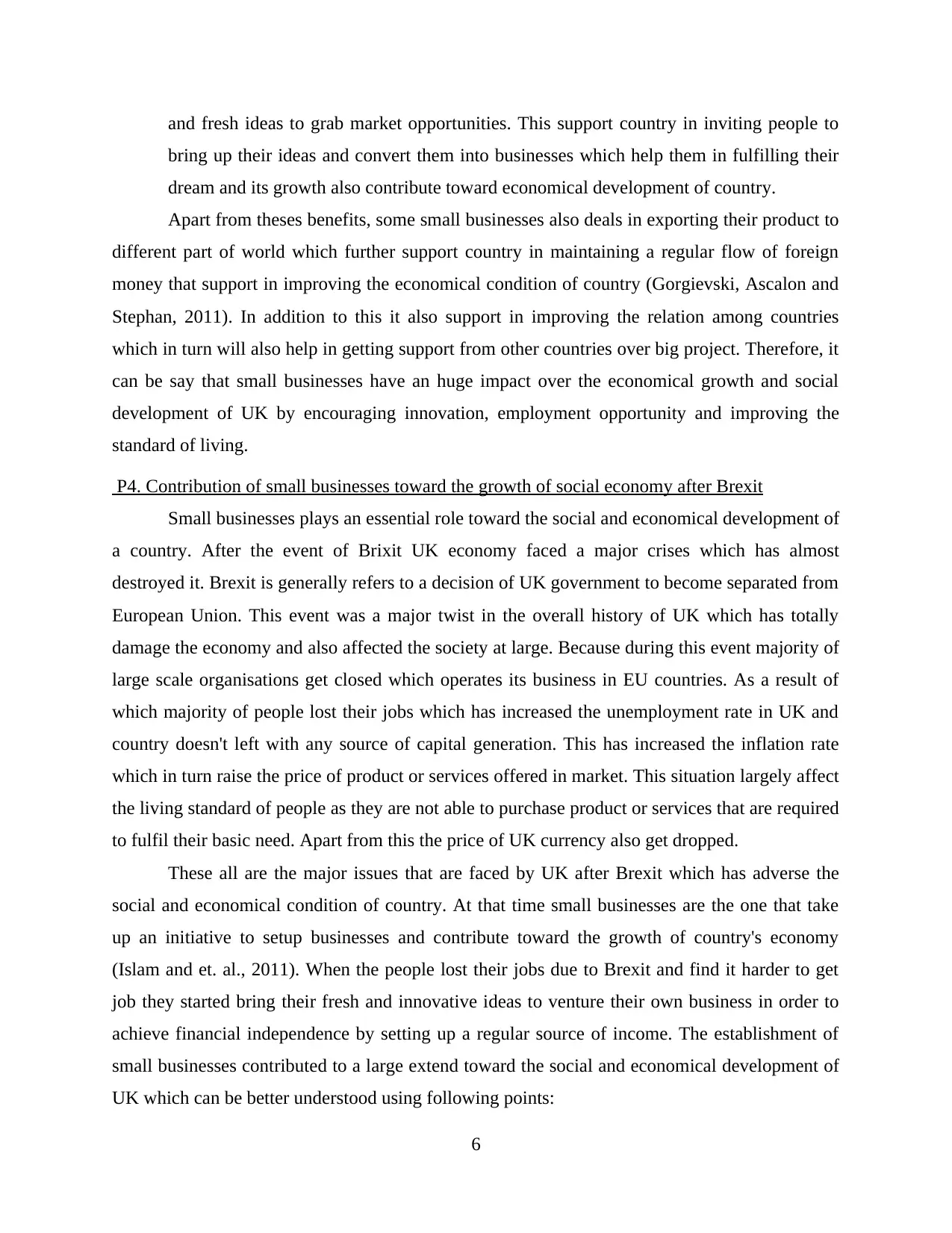
and fresh ideas to grab market opportunities. This support country in inviting people to
bring up their ideas and convert them into businesses which help them in fulfilling their
dream and its growth also contribute toward economical development of country.
Apart from theses benefits, some small businesses also deals in exporting their product to
different part of world which further support country in maintaining a regular flow of foreign
money that support in improving the economical condition of country (Gorgievski, Ascalon and
Stephan, 2011). In addition to this it also support in improving the relation among countries
which in turn will also help in getting support from other countries over big project. Therefore, it
can be say that small businesses have an huge impact over the economical growth and social
development of UK by encouraging innovation, employment opportunity and improving the
standard of living.
P4. Contribution of small businesses toward the growth of social economy after Brexit
Small businesses plays an essential role toward the social and economical development of
a country. After the event of Brixit UK economy faced a major crises which has almost
destroyed it. Brexit is generally refers to a decision of UK government to become separated from
European Union. This event was a major twist in the overall history of UK which has totally
damage the economy and also affected the society at large. Because during this event majority of
large scale organisations get closed which operates its business in EU countries. As a result of
which majority of people lost their jobs which has increased the unemployment rate in UK and
country doesn't left with any source of capital generation. This has increased the inflation rate
which in turn raise the price of product or services offered in market. This situation largely affect
the living standard of people as they are not able to purchase product or services that are required
to fulfil their basic need. Apart from this the price of UK currency also get dropped.
These all are the major issues that are faced by UK after Brexit which has adverse the
social and economical condition of country. At that time small businesses are the one that take
up an initiative to setup businesses and contribute toward the growth of country's economy
(Islam and et. al., 2011). When the people lost their jobs due to Brexit and find it harder to get
job they started bring their fresh and innovative ideas to venture their own business in order to
achieve financial independence by setting up a regular source of income. The establishment of
small businesses contributed to a large extend toward the social and economical development of
UK which can be better understood using following points:
6
bring up their ideas and convert them into businesses which help them in fulfilling their
dream and its growth also contribute toward economical development of country.
Apart from theses benefits, some small businesses also deals in exporting their product to
different part of world which further support country in maintaining a regular flow of foreign
money that support in improving the economical condition of country (Gorgievski, Ascalon and
Stephan, 2011). In addition to this it also support in improving the relation among countries
which in turn will also help in getting support from other countries over big project. Therefore, it
can be say that small businesses have an huge impact over the economical growth and social
development of UK by encouraging innovation, employment opportunity and improving the
standard of living.
P4. Contribution of small businesses toward the growth of social economy after Brexit
Small businesses plays an essential role toward the social and economical development of
a country. After the event of Brixit UK economy faced a major crises which has almost
destroyed it. Brexit is generally refers to a decision of UK government to become separated from
European Union. This event was a major twist in the overall history of UK which has totally
damage the economy and also affected the society at large. Because during this event majority of
large scale organisations get closed which operates its business in EU countries. As a result of
which majority of people lost their jobs which has increased the unemployment rate in UK and
country doesn't left with any source of capital generation. This has increased the inflation rate
which in turn raise the price of product or services offered in market. This situation largely affect
the living standard of people as they are not able to purchase product or services that are required
to fulfil their basic need. Apart from this the price of UK currency also get dropped.
These all are the major issues that are faced by UK after Brexit which has adverse the
social and economical condition of country. At that time small businesses are the one that take
up an initiative to setup businesses and contribute toward the growth of country's economy
(Islam and et. al., 2011). When the people lost their jobs due to Brexit and find it harder to get
job they started bring their fresh and innovative ideas to venture their own business in order to
achieve financial independence by setting up a regular source of income. The establishment of
small businesses contributed to a large extend toward the social and economical development of
UK which can be better understood using following points:
6
⊘ This is a preview!⊘
Do you want full access?
Subscribe today to unlock all pages.

Trusted by 1+ million students worldwide
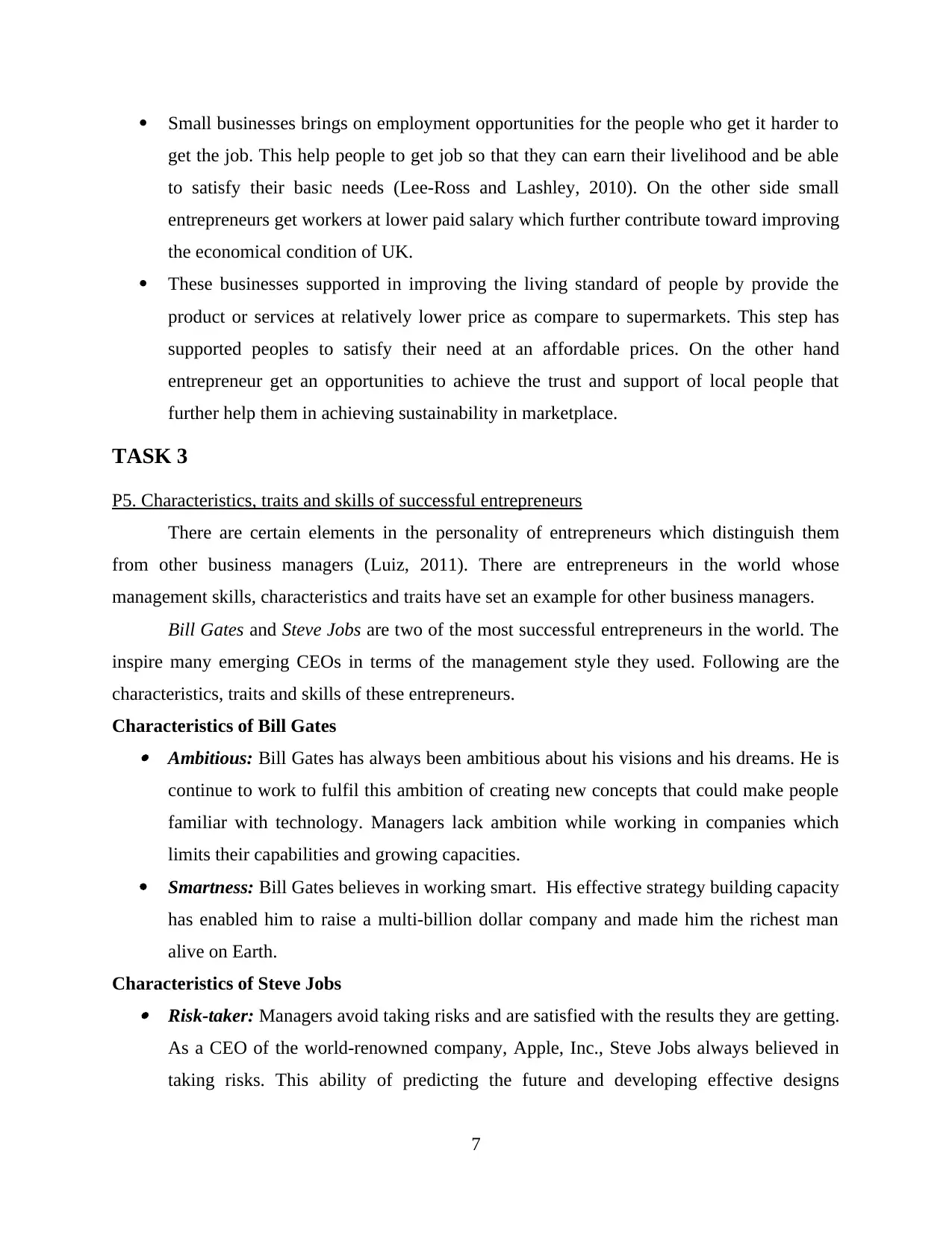
Small businesses brings on employment opportunities for the people who get it harder to
get the job. This help people to get job so that they can earn their livelihood and be able
to satisfy their basic needs (Lee-Ross and Lashley, 2010). On the other side small
entrepreneurs get workers at lower paid salary which further contribute toward improving
the economical condition of UK.
These businesses supported in improving the living standard of people by provide the
product or services at relatively lower price as compare to supermarkets. This step has
supported peoples to satisfy their need at an affordable prices. On the other hand
entrepreneur get an opportunities to achieve the trust and support of local people that
further help them in achieving sustainability in marketplace.
TASK 3
P5. Characteristics, traits and skills of successful entrepreneurs
There are certain elements in the personality of entrepreneurs which distinguish them
from other business managers (Luiz, 2011). There are entrepreneurs in the world whose
management skills, characteristics and traits have set an example for other business managers.
Bill Gates and Steve Jobs are two of the most successful entrepreneurs in the world. The
inspire many emerging CEOs in terms of the management style they used. Following are the
characteristics, traits and skills of these entrepreneurs.
Characteristics of Bill Gates Ambitious: Bill Gates has always been ambitious about his visions and his dreams. He is
continue to work to fulfil this ambition of creating new concepts that could make people
familiar with technology. Managers lack ambition while working in companies which
limits their capabilities and growing capacities.
Smartness: Bill Gates believes in working smart. His effective strategy building capacity
has enabled him to raise a multi-billion dollar company and made him the richest man
alive on Earth.
Characteristics of Steve Jobs Risk-taker: Managers avoid taking risks and are satisfied with the results they are getting.
As a CEO of the world-renowned company, Apple, Inc., Steve Jobs always believed in
taking risks. This ability of predicting the future and developing effective designs
7
get the job. This help people to get job so that they can earn their livelihood and be able
to satisfy their basic needs (Lee-Ross and Lashley, 2010). On the other side small
entrepreneurs get workers at lower paid salary which further contribute toward improving
the economical condition of UK.
These businesses supported in improving the living standard of people by provide the
product or services at relatively lower price as compare to supermarkets. This step has
supported peoples to satisfy their need at an affordable prices. On the other hand
entrepreneur get an opportunities to achieve the trust and support of local people that
further help them in achieving sustainability in marketplace.
TASK 3
P5. Characteristics, traits and skills of successful entrepreneurs
There are certain elements in the personality of entrepreneurs which distinguish them
from other business managers (Luiz, 2011). There are entrepreneurs in the world whose
management skills, characteristics and traits have set an example for other business managers.
Bill Gates and Steve Jobs are two of the most successful entrepreneurs in the world. The
inspire many emerging CEOs in terms of the management style they used. Following are the
characteristics, traits and skills of these entrepreneurs.
Characteristics of Bill Gates Ambitious: Bill Gates has always been ambitious about his visions and his dreams. He is
continue to work to fulfil this ambition of creating new concepts that could make people
familiar with technology. Managers lack ambition while working in companies which
limits their capabilities and growing capacities.
Smartness: Bill Gates believes in working smart. His effective strategy building capacity
has enabled him to raise a multi-billion dollar company and made him the richest man
alive on Earth.
Characteristics of Steve Jobs Risk-taker: Managers avoid taking risks and are satisfied with the results they are getting.
As a CEO of the world-renowned company, Apple, Inc., Steve Jobs always believed in
taking risks. This ability of predicting the future and developing effective designs
7
Paraphrase This Document
Need a fresh take? Get an instant paraphrase of this document with our AI Paraphraser
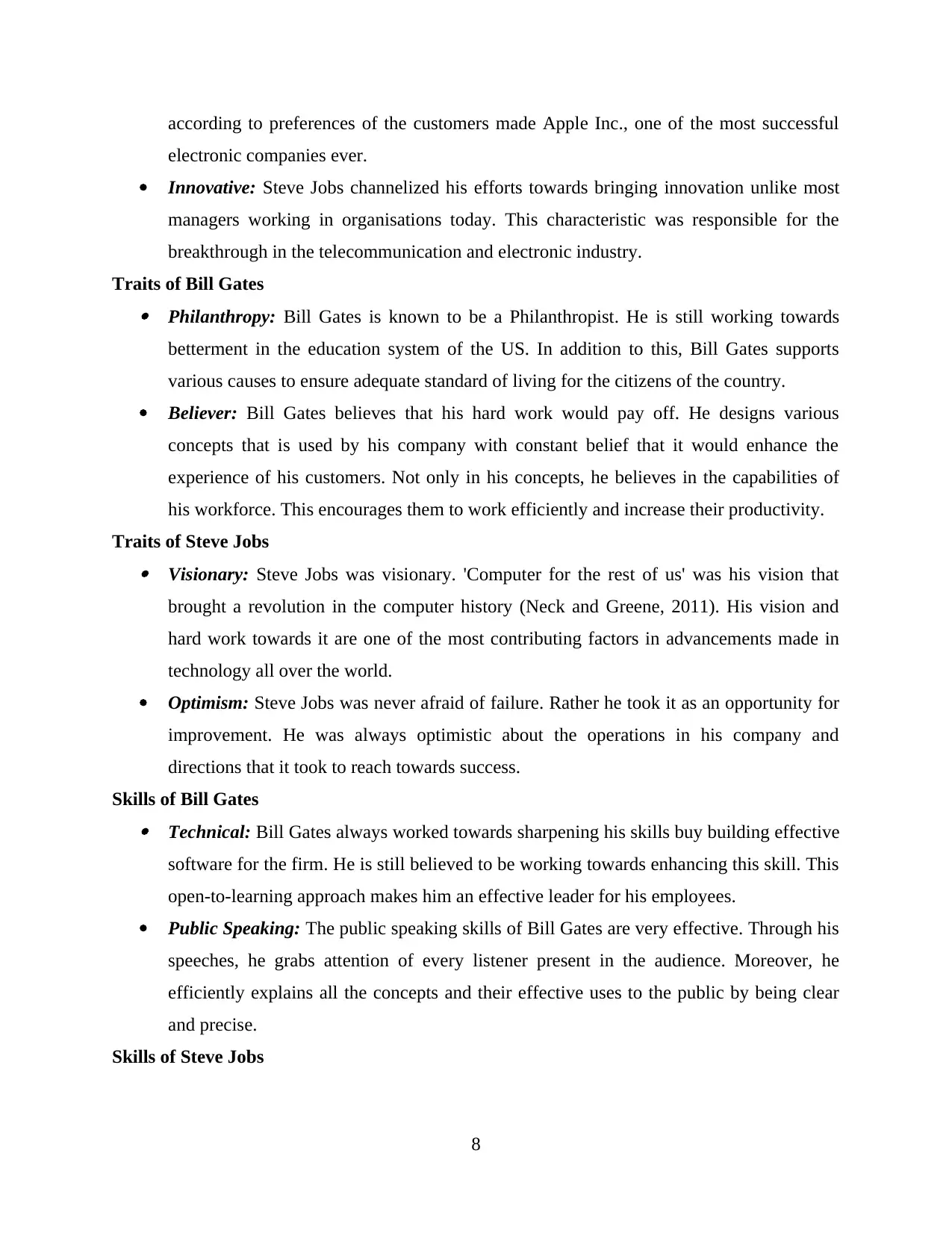
according to preferences of the customers made Apple Inc., one of the most successful
electronic companies ever.
Innovative: Steve Jobs channelized his efforts towards bringing innovation unlike most
managers working in organisations today. This characteristic was responsible for the
breakthrough in the telecommunication and electronic industry.
Traits of Bill Gates Philanthropy: Bill Gates is known to be a Philanthropist. He is still working towards
betterment in the education system of the US. In addition to this, Bill Gates supports
various causes to ensure adequate standard of living for the citizens of the country.
Believer: Bill Gates believes that his hard work would pay off. He designs various
concepts that is used by his company with constant belief that it would enhance the
experience of his customers. Not only in his concepts, he believes in the capabilities of
his workforce. This encourages them to work efficiently and increase their productivity.
Traits of Steve Jobs Visionary: Steve Jobs was visionary. 'Computer for the rest of us' was his vision that
brought a revolution in the computer history (Neck and Greene, 2011). His vision and
hard work towards it are one of the most contributing factors in advancements made in
technology all over the world.
Optimism: Steve Jobs was never afraid of failure. Rather he took it as an opportunity for
improvement. He was always optimistic about the operations in his company and
directions that it took to reach towards success.
Skills of Bill Gates Technical: Bill Gates always worked towards sharpening his skills buy building effective
software for the firm. He is still believed to be working towards enhancing this skill. This
open-to-learning approach makes him an effective leader for his employees.
Public Speaking: The public speaking skills of Bill Gates are very effective. Through his
speeches, he grabs attention of every listener present in the audience. Moreover, he
efficiently explains all the concepts and their effective uses to the public by being clear
and precise.
Skills of Steve Jobs
8
electronic companies ever.
Innovative: Steve Jobs channelized his efforts towards bringing innovation unlike most
managers working in organisations today. This characteristic was responsible for the
breakthrough in the telecommunication and electronic industry.
Traits of Bill Gates Philanthropy: Bill Gates is known to be a Philanthropist. He is still working towards
betterment in the education system of the US. In addition to this, Bill Gates supports
various causes to ensure adequate standard of living for the citizens of the country.
Believer: Bill Gates believes that his hard work would pay off. He designs various
concepts that is used by his company with constant belief that it would enhance the
experience of his customers. Not only in his concepts, he believes in the capabilities of
his workforce. This encourages them to work efficiently and increase their productivity.
Traits of Steve Jobs Visionary: Steve Jobs was visionary. 'Computer for the rest of us' was his vision that
brought a revolution in the computer history (Neck and Greene, 2011). His vision and
hard work towards it are one of the most contributing factors in advancements made in
technology all over the world.
Optimism: Steve Jobs was never afraid of failure. Rather he took it as an opportunity for
improvement. He was always optimistic about the operations in his company and
directions that it took to reach towards success.
Skills of Bill Gates Technical: Bill Gates always worked towards sharpening his skills buy building effective
software for the firm. He is still believed to be working towards enhancing this skill. This
open-to-learning approach makes him an effective leader for his employees.
Public Speaking: The public speaking skills of Bill Gates are very effective. Through his
speeches, he grabs attention of every listener present in the audience. Moreover, he
efficiently explains all the concepts and their effective uses to the public by being clear
and precise.
Skills of Steve Jobs
8
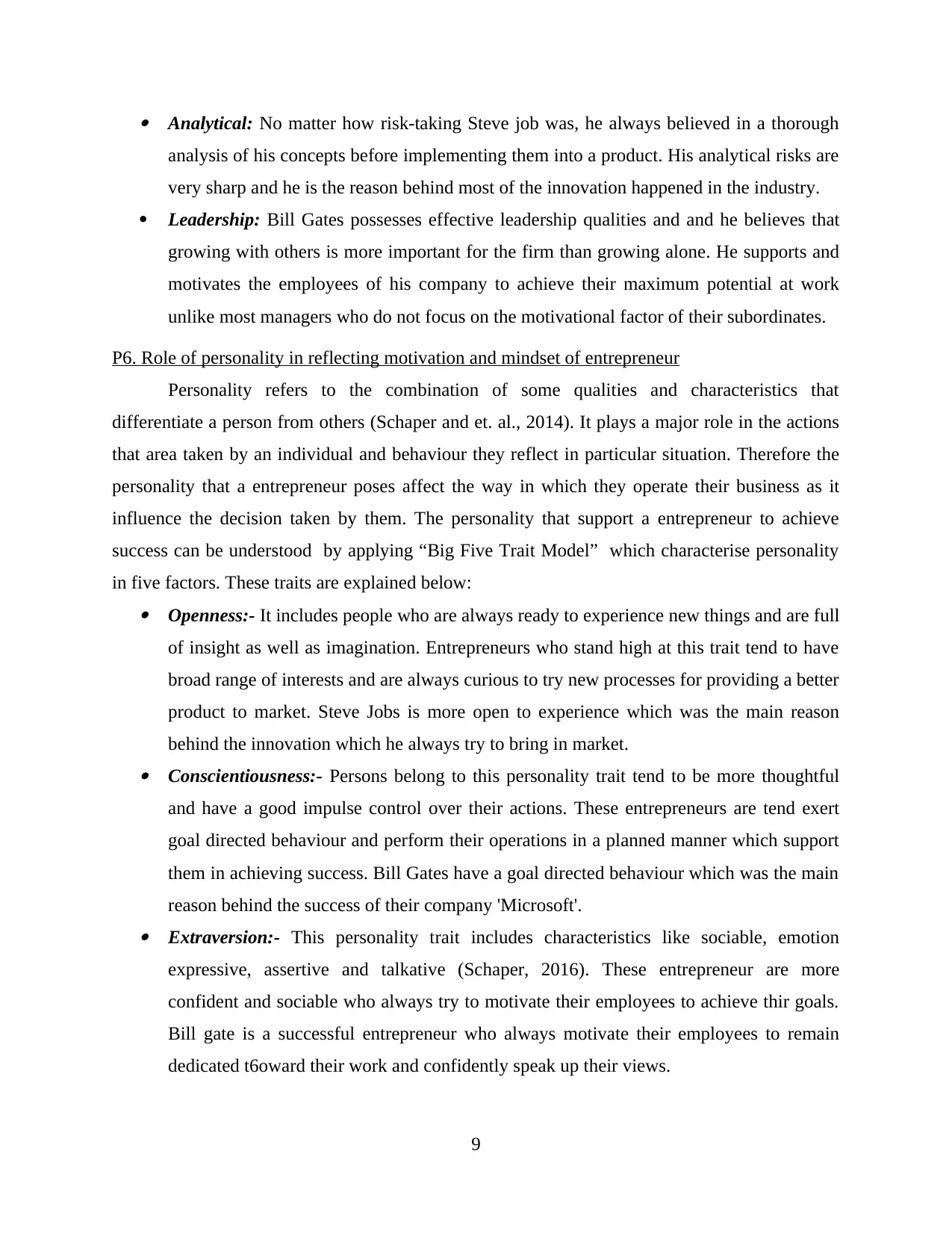
Analytical: No matter how risk-taking Steve job was, he always believed in a thorough
analysis of his concepts before implementing them into a product. His analytical risks are
very sharp and he is the reason behind most of the innovation happened in the industry.
Leadership: Bill Gates possesses effective leadership qualities and and he believes that
growing with others is more important for the firm than growing alone. He supports and
motivates the employees of his company to achieve their maximum potential at work
unlike most managers who do not focus on the motivational factor of their subordinates.
P6. Role of personality in reflecting motivation and mindset of entrepreneur
Personality refers to the combination of some qualities and characteristics that
differentiate a person from others (Schaper and et. al., 2014). It plays a major role in the actions
that area taken by an individual and behaviour they reflect in particular situation. Therefore the
personality that a entrepreneur poses affect the way in which they operate their business as it
influence the decision taken by them. The personality that support a entrepreneur to achieve
success can be understood by applying “Big Five Trait Model” which characterise personality
in five factors. These traits are explained below: Openness:- It includes people who are always ready to experience new things and are full
of insight as well as imagination. Entrepreneurs who stand high at this trait tend to have
broad range of interests and are always curious to try new processes for providing a better
product to market. Steve Jobs is more open to experience which was the main reason
behind the innovation which he always try to bring in market. Conscientiousness:- Persons belong to this personality trait tend to be more thoughtful
and have a good impulse control over their actions. These entrepreneurs are tend exert
goal directed behaviour and perform their operations in a planned manner which support
them in achieving success. Bill Gates have a goal directed behaviour which was the main
reason behind the success of their company 'Microsoft'. Extraversion:- This personality trait includes characteristics like sociable, emotion
expressive, assertive and talkative (Schaper, 2016). These entrepreneur are more
confident and sociable who always try to motivate their employees to achieve thir goals.
Bill gate is a successful entrepreneur who always motivate their employees to remain
dedicated t6oward their work and confidently speak up their views.
9
analysis of his concepts before implementing them into a product. His analytical risks are
very sharp and he is the reason behind most of the innovation happened in the industry.
Leadership: Bill Gates possesses effective leadership qualities and and he believes that
growing with others is more important for the firm than growing alone. He supports and
motivates the employees of his company to achieve their maximum potential at work
unlike most managers who do not focus on the motivational factor of their subordinates.
P6. Role of personality in reflecting motivation and mindset of entrepreneur
Personality refers to the combination of some qualities and characteristics that
differentiate a person from others (Schaper and et. al., 2014). It plays a major role in the actions
that area taken by an individual and behaviour they reflect in particular situation. Therefore the
personality that a entrepreneur poses affect the way in which they operate their business as it
influence the decision taken by them. The personality that support a entrepreneur to achieve
success can be understood by applying “Big Five Trait Model” which characterise personality
in five factors. These traits are explained below: Openness:- It includes people who are always ready to experience new things and are full
of insight as well as imagination. Entrepreneurs who stand high at this trait tend to have
broad range of interests and are always curious to try new processes for providing a better
product to market. Steve Jobs is more open to experience which was the main reason
behind the innovation which he always try to bring in market. Conscientiousness:- Persons belong to this personality trait tend to be more thoughtful
and have a good impulse control over their actions. These entrepreneurs are tend exert
goal directed behaviour and perform their operations in a planned manner which support
them in achieving success. Bill Gates have a goal directed behaviour which was the main
reason behind the success of their company 'Microsoft'. Extraversion:- This personality trait includes characteristics like sociable, emotion
expressive, assertive and talkative (Schaper, 2016). These entrepreneur are more
confident and sociable who always try to motivate their employees to achieve thir goals.
Bill gate is a successful entrepreneur who always motivate their employees to remain
dedicated t6oward their work and confidently speak up their views.
9
⊘ This is a preview!⊘
Do you want full access?
Subscribe today to unlock all pages.

Trusted by 1+ million students worldwide
1 out of 16
Related Documents
Your All-in-One AI-Powered Toolkit for Academic Success.
+13062052269
info@desklib.com
Available 24*7 on WhatsApp / Email
![[object Object]](/_next/static/media/star-bottom.7253800d.svg)
Unlock your academic potential
Copyright © 2020–2025 A2Z Services. All Rights Reserved. Developed and managed by ZUCOL.





